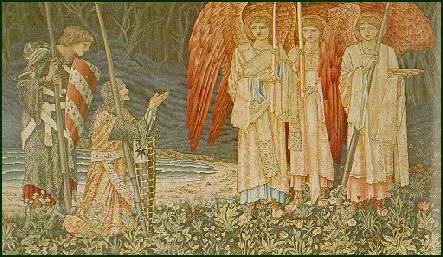

 |
Perceval is a type of blessed fool, a heroic knight who sees the Grail and visits the Fisher King in his mysterious castle. He is not the brightest of Arthur's knights but this does not seem to impede his success in any way, perhaps a comment on tolerance among the Knights of the Round Table, or maybe a reflection of the general IQ. His is also a coming-of-age story, of a son who leaves his mother to become a man. He appears first in the Conte de Graal, a romance by Chretien de Troyes, written in the twelfth century, then reappears in the Continuations of Chretien's story. In the second Continuation, Perceval seeks the Grail with some success; in the third Continuation, he is crowned Grail King. His story was also told by Wolfram von Eschenbach in his Parzival, and much later, by Wagner in the opera Parsifal. The character has also appeared in recent films, including Excalibur, where Perceval has a minor role, in Perceval le Gallois, a 1978 film by Eric Rohmer, and in the German films Parzival, directed in 1980 by Richard Blank, and the 1981/82 film version of the opera, Parsifal, directed by Hans-Jurgen Syberberg, in which the action occurs on a stage dressed to represent a gigantic death mask of Wagner. The recent hit Forrest Gump, however indirectly, also seems to draw from the Perceval legend. |